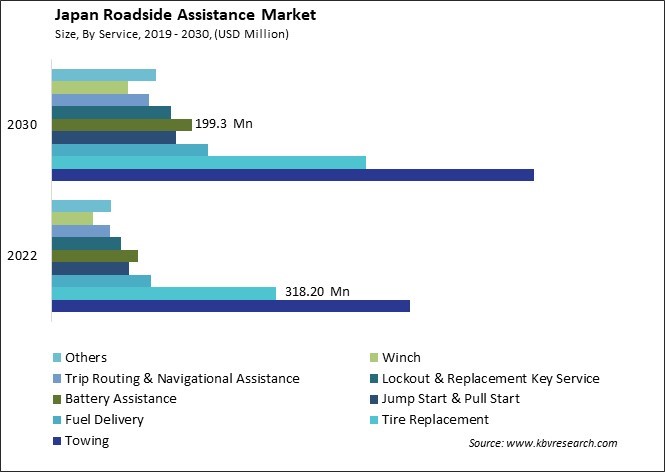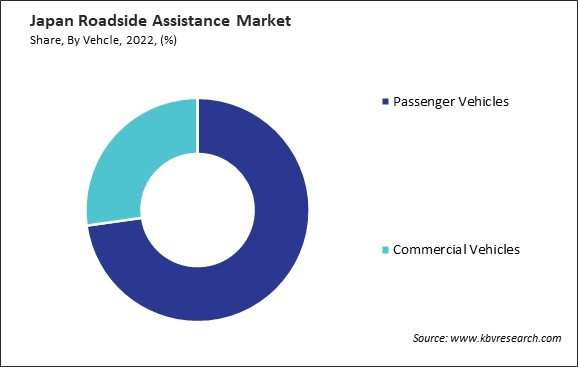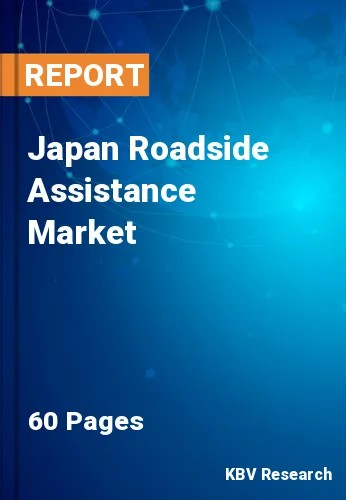The Japan Roadside Assistance Market size is expected to reach $2.3 billion by 2030, rising at a market growth of 4.9% CAGR during the forecast period.
The roadside assistance market in Japan has experienced significant growth and evolution in recent years, reflecting the country's dynamic automotive landscape and commitment to customer-centric services. As a nation with a high density of vehicles and a culture deeply rooted in technological innovation, Japan's roadside assistance sector plays a pivotal role in ensuring the smooth functioning of its extensive road networks.

Automobile industry players offering roadside assistance services in Japan capitalize on the roadside assistance market by enhancing their capabilities to address issues specific to electric vehicles, such as charging-related problems or battery-related concerns. As the industry evolves, adapting to the changing composition of vehicles on the road becomes crucial for roadside assistance providers, ensuring they stay ahead in meeting the diverse needs of motorists in Japan's dynamic automobile landscape.
The Japan Automobile Dealers Association (JADA) in 2021 reported a total of 3,675,650 new car sales, with an impressive 40.5% of these being electric vehicles (EVs). While Hybrid Electric Vehicles (HEVs) continued to dominate the EV industry, constituting 96.8% of new EV sales, there was notable year-over-year growth in the adoption of Battery Electric Vehicles (BEVs), Plug-in Hybrid Electric Vehicles (PHEVs), and Fuel Cell Electric Vehicles (FCEVs).
This surge in electric vehicle popularity signifies a shift in the automotive landscape, prompting changes and opportunities in related industries. For instance, the growing prevalence of EVs have implications for the roadside assistance market in Japan. As the number of electric vehicles on the roads increases, there may be a rising demand for specialized roadside assistance services tailored to the unique needs of EVs.
In recent years, Japan has witnessed a significant surge in technology integration and mobile app platforms within the roadside assistance market, reshaping the landscape of automotive support services. This transformation is symbolic of Japan's commitment to innovation and efficiency in addressing the needs of its extensive road network and vehicle-dependent populace.
The rise of technology in the roadside assistance sector is attributed to the increasing reliance on smartphones and connected devices. Japanese consumers, renowned for their tech-savvy preferences, have embraced mobile apps as a convenient and accessible means to access roadside assistance services. These apps offer a seamless interface, allowing users to request assistance, track service providers in real-time, and receive timely updates on their request status. One of the key drivers of this technological shift is the emphasis on enhancing response times and providing more tailored solutions. Mobile apps enable users to pinpoint their exact location, streamlining the dispatch process for assistance providers.
Moreover, integrating advanced features such as AI-powered diagnostics and predictive maintenance has further elevated the quality of roadside assistance services in Japan. Mobile apps equipped with these technologies assess vehicle issues remotely, offering valuable insights to service providers before they reach the stranded motorist. This proactive approach reduces downtime and enhances the overall customer experience. Therefore, Japan's embrace of technology in the roadside assistance market reflects a commitment to efficient and innovative solutions driven by the tech-savvy preferences of its consumers. With mobile apps seamlessly integrating advanced features, the nation's automotive support services are poised for continued enhancement, ensuring swift and tailored solutions for its extensive road network.
Japan has witnessed a notable surge in companies specializing in battery replacement services within the roadside assistance market in recent years. This trend is attributed to the increasing reliance on automobiles for daily commuting and a growing awareness of the importance of maintaining vehicle health. The Japanese automotive landscape, known for its innovation and technology adoption, has seen a shift in consumer preferences towards electric and hybrid vehicles, further emphasizing the need for efficient battery-related services.
One key driver behind the rise of specialized battery replacement services is the rapid expansion of Japan's electric vehicle (EV) industry. As the adoption of EVs continues to gain momentum, there is a parallel demand for expertise in handling electric vehicle batteries. These specialized roadside assistance companies have positioned themselves as crucial players in this evolving landscape, providing on-the-spot battery replacement services to stranded EV owners.
Moreover, the harsh weather conditions in certain regions of Japan, especially during winter, increase battery failures. This has created a niche for companies offering swift and efficient roadside assistance, focusing specifically on battery replacements. The ability to respond promptly to such emergencies has become a distinguishing factor for these service providers, garnering trust among Japanese motorists.
Japanese consumers, known for their emphasis on reliability and service quality, are increasingly opting for specialized battery replacement services due to the assurance of technical proficiency. These companies often deploy skilled technicians with the latest diagnostic tools, ensuring a seamless and hassle-free experience for drivers facing battery issues. Hence, the surge in companies specializing in battery replacement services within the Japanese roadside assistance market responds to the evolving automotive landscape, particularly the rise of electric vehicles.

Japan's roadside assistance market is characterized by a mix of traditional automobile associations, insurance companies, and newer technology-driven platforms, all contributing to the efficient and reliable provision of services to stranded motorists. JAF (Japan Automobile Federation) is one of the most prominent organizations in Japan's roadside assistance landscape. As an automobile association, JAF provides its members with a wide range of services, including emergency roadside assistance, towing, battery service, and flat tire assistance. JAF's extensive network of service providers ensures nationwide coverage.
Tokio Marine & Nichido Fire Insurance Co. Ltd. offers roadside assistance services as part of its insurance coverage. This includes towing, battery jump-starts, and emergency fuel delivery. The company aims to provide comprehensive support to policyholders during emergencies. Similarly, Nipponkoa Insurance (Sompo Japan Nipponkoa Insurance Inc.), another major player in the insurance sector, Nipponkoa Insurance, provides roadside assistance services to its policyholders. The services offered typically include towing, tire changes, lockout assistance, and other emergency support to ensure the safety and convenience of drivers.
Toyota Road Service, one of Japan's leading automakers, provides roadside assistance services to its customers through the Toyota Road Service program. The services include towing, flat tire assistance, battery service, and other emergency support for Toyota vehicle owners.
NAVITIME is a technology-driven platform that offers roadside assistance services through its app. Users requests services such as towing, battery replacement, and emergency fuel delivery through the app, providing a modern and convenient way for drivers to access assistance.
Aisin Seiki Co., Ltd. It is a major automotive components manufacturer and provides roadside assistance services through its network. The services include towing, battery service, tire changes, and other emergency support. Aisin Seiki aims to leverage its automotive components expertise to offer drivers reliable assistance.
By Service
By Vehicle
By Provider
Our team of dedicated experts can provide you with attractive expansion opportunities for your business.

